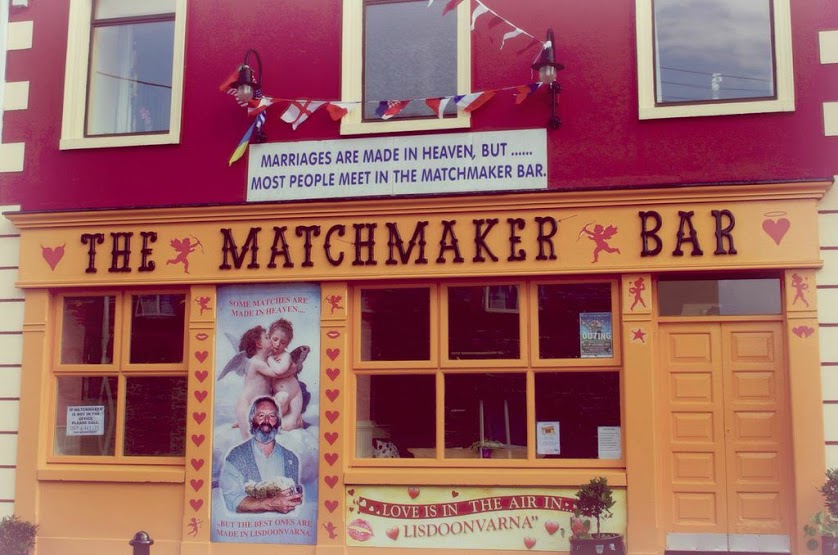Rachel Lavin | Magazine Editor
Lisdoonvarna is a small village situated in north county Clare, and has the kind of quintessentially traditional Irish look that has American tourists coming in their droves to take postcard-perfect photos of the pub filled streets, wooden-frame fronted shops, and quaint hotels that were built in the 50’s, and have names like ‘The Ritz’.
The town, of course, is famous for its matchmaking festival, which serves as a sort of a mecca for lonely rural bachelors and single women teetering on the edge of their prime. Every year, for the month of September, these lonely hearts descend on the small town to seek help from the town’s famed matchmaker, Willie Daly, in order to find that ‘one true love’.
The clientele this weekend, however, would be a little different to the festival’s one hundred and fifty year history. For, on this glum rainy weekend in October, this rural tourist town would become host to the world’s only LGBT matchmaking festival.
To get to this small rural village from Dublin, it takes three trains and two buses over the course of five hours. But even the nauseating bus ride through the winding hair-pin roads was worth it, in order to witness the beautiful, if a little surprising, mix of Ireland’s most progressive community with such a typically conservative setting.
Arriving in the village at noon on the Saturday, we find that the town’s square is all dressed up in its best rainbow colours. Bunting hangs from every available height, streaming from one telephone pole to the next, and zig-zagging down every street. The universal LGBT rainbow flag hangs from the windows of every local business. Large, and endearingly kitsch, pink cardboard hearts, that say “All you need is love”, have been individually taped to each available signpost for about a mile outside the town.
We make our way up the main street, where we pass Willie Daly’s matchmaking bar. It has an orange wood-panelled front and, if that wasn’t eye-catching enough, on the central wooden panel there is a painted mural of Willie himself surrounded by clouds and angels, below which it says “Marriages are made in heaven…but most people meet in the Matchmaker Bar’.
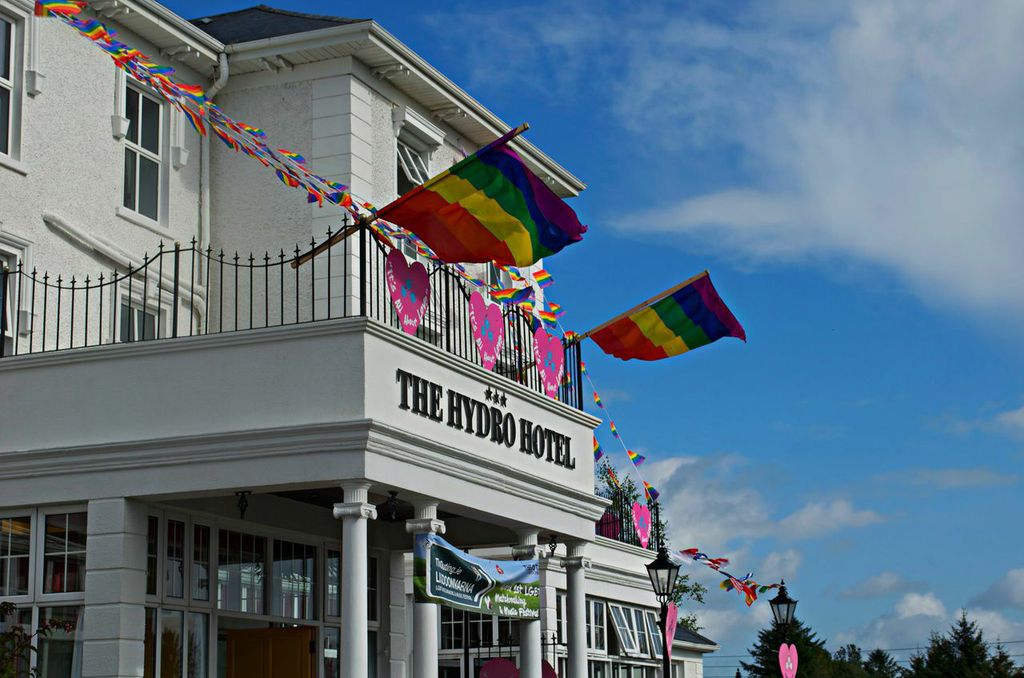
We keep walking to the edge of the village and find ourselves outside The Hydro Hotel which is covered in more rainbow bunting than the entire town combined. This is where the main events of the weekend will take place. Inside, there is a decidedly hungover atmosphere at the moment, as punters nurse litres of water and lounge silently on the couches, clearly recovering from the events of the night before. The room, however, is quickly brought to life by Eddie McGuinness, one of the chief organizers of the event, who greets us with a warm welcome. While stopping for a quick break to have a pint, Eddie has us cracking up with stories of his career as a world champion hip hop dancer and all the juicy gossip from the night before. Eddie explains how he was always active in organising gay pride events, but it wasn’t until he was contacted by Marcus White, the manager of the Hydro Hotel, who made the suggestion of adding an L.G.B.T. element to the traditional festival, that ‘The Outing’ was born. Since establishing a local connection, Eddie spent a year planning the festival with as many friends as he could possibly rope in as well as the famed Panti Bliss, who agreed to host it. This is the second year of the festival, and it is the only one of its kind in the world. ‘I’m already planning next year’s one’ he says enthusiastically, and with the last drop of the pint glugged, Eddie is back in action. ‘We’re bringing you to the picnic’, he says and off we go.
With a life-size cut-out of Panti and an eight foot rainbow flag crammed into his small car, we head up through the winding rural roads to the Cliffs of Moher. There, we meet about twenty or so guests who are here for the weekend and, after a quick tour of the awe-inspiring tourist attraction, we sit down outside the centre for some food. The group consists of mostly middle-aged and older men, all telling stories, joking and gossiping between mouthfuls of salad and cake.
Amid all the banter, Eddie introduces me to Darren, as ‘the first successful hook-up of the LGBT matchmaking weekend’. Darren is a friendly, good looking guy in his early thirties, who is bi-sexual. He explains why ‘The Outing’ appealed to him.
‘I’ve only started asking people out on dates recently and even though the gay scene has a strong hook-up culture, I think the elements of traditional romance still appeal for those wanting to settle down. That’s why the matchmaking was such a big selling point. I like how they are taking something so traditionally Irish and adding a modern twist.’
Darren thinks that the festival is not just good for the gay community, however, but for the local community as well. From personal experience, he thinks exposure is an important factor in getting society to accept the LGBT community. He explains, ‘When I came out to my father, he went and sat in silence in the next room for three hours. His whole paradigm had shifted. Once the three hours was over, however, he had faced up to it. He just needed to be presented with it, and now he has no problem. So, that’s why it’s great to see an event like this because it forces people to think about it, and eventually to realise what a non-issue being gay really is’.
For the most part, as an openly gay man living in Dublin, Darren has found ‘nothing but good experiences’ and he has ‘never had any issues.’ But he does admit that his experiences are coming from someone who lives in Dublin’s city center and says ‘We all have known someone whose been beaten up because of it. And that’s in Dublin, a supposedly modern city.’ Another punter Jason adds ‘Certainly, where it’s safe to hold hands is an open question in the gay community’. But Darren is still positive ‘I do think these are isolated incidences though. This country has come a long way’.
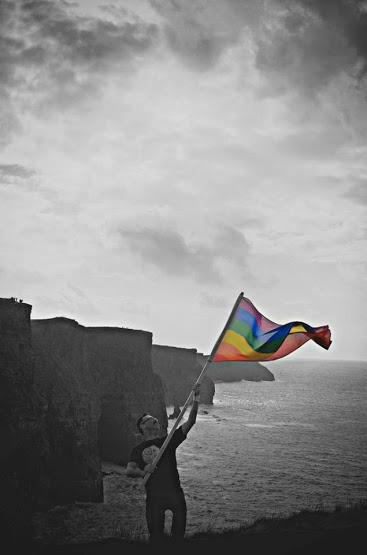
Later, while touring the museum I strike up chat with Gerry, a gentle Cork man in his early fifties who tells me why he decided to come for the matchmaking. ‘I suppose I just came for the social element and to meet gay men my own age. The profile here is probably older guys.’ Of course, Gerry is right about the generation gap. A lot of the male guests here are middle-aged and above. This seems emblematic of a wider cultural trend among the gay community. Those who have settled are no longer on the scene but the reason there is still an older crowd looking for love points to something deeper. While there are those younger men who are reaching the age where they just want to settle down, there are also many older men grew up in a more oppressed society, and thus, came out later in life when being gay was more accepted. Thus, there are only able to openly look for love now.
Gerry explains, ‘When I left school in Cork there was no gay culture or scene, no nightclubs nothing. There was no space for someone to come out. It wasn’t even legal in the 80s.’
Because of this hostile culture, Gerry did not come out until he was in his mid-thirties, and only because he was motivated by a dramatic event. ‘What motivated me to come out was that my first cousin had a brain tumour and although she survived, I realized life’s too short. Her misfortune was my fortune.’
‘Coming out was difficult. Someone once said to me it’s something you wouldn’t choose. You wouldn’t choose to put yourself through the difficulties but you can’t ignore it.’ However Gerry is hopeful though for the next generation. ‘I think younger generations are free from a lot of the animosity toward being gay I grew up with.’
It’s time to pack up to leave and I take this opportunity to cajole Eddie into a photo in front of the cliffs. Breaking the rules he hops onto a grassy knoll that slopes down to the steep cut-off of the cliffs and begins waving his rainbow flag enthusiastically in front of the landmark. Some passing American tourists stop us to tell us how proud they are to see ‘our flag’. As we head back through the center on our way out the locals working at the museum are jokingly harassing Eddie for free tickets to the Hydro tonight. This gets me thinking about how the Lisdoonvarna locals are responding to the festival’s new LGBT twist. As we drive back into town we pass one pub conspicuously not displaying the rainbow flag and I decide to approach it later.
When we arrive back to the hotel it is clear the hangovers have subsided and the foyer is abuzz with punters drinking, chatting and flirting. Two drag queens gracefully descend the stairs in full-on glamorous attire as a few sheepish locals drift in and out curiously. A hen party dressed as fifties housewives have joined the celebrations whilt some unsuspecting hotel guests sit in the foyer’s couches amid all the excitement, looking a little bit put out.
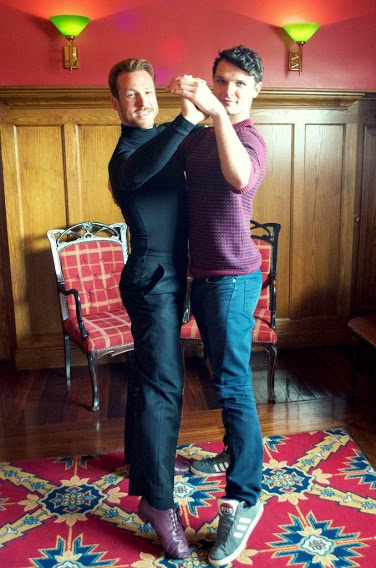
In the main bar the tea dance is starting. On the dance floor Mr Gay World and Mr Gay Ireland are leading a same-sex ballroom lesson. As the lessons begin, the rowdy hens join the class. Meanwhile, locals are milling in and out. They watch the same sex couples salsa-ing silently, peering around at the clientele curiously, neither overly warm nor disdainful, although all seem a little reluctant to comment when I approach with my notebook in hand. Outside I join a group of women in the smoking area where I meet a very elegant older woman called Bernadette, who lives locally and has a lesbian partner.
As a gaggling pile of hens pass us Bernadette makes the point that, ‘I worry that an awful lot of people might treat this festival as some kind of zoo, to look at us as if we are novelties. We are not novelties, we are real people and we want to be taken seriously’. Bernadette works as a psychotherapist, specialising in helping young LGBT people with coming out and coping with the animosity they face. She says they ‘see an awful lot of damage done by suppressing their sexuality. Young men especially’.
When I enquire why there seems to be fewer women punters present, she remarks,‘well I do think there are less women but that may link to typical patriarchal reasons, be that economics or childcare. Women may not be able to afford to come, or may be looking after their children, or both. Although, another side to that is women aren’t here because they have children to look after in the first place. Unfortunately for most gay men, having children in this country is still not an option’.
Bernadette leaves to meet her partner while I head back into the hallway, distracted by all the information from my interviews, when all of a sudden, in walks the matchmaker himself, Willie Daly. He has a wild head of grey hair with a full beard and a sort of mystical twinkle in his eye, but perhaps that is just my imagination. I approach him for an interview and we find a quiet corner where he leaves down an old book consisting of old yellowing documents bound with string.
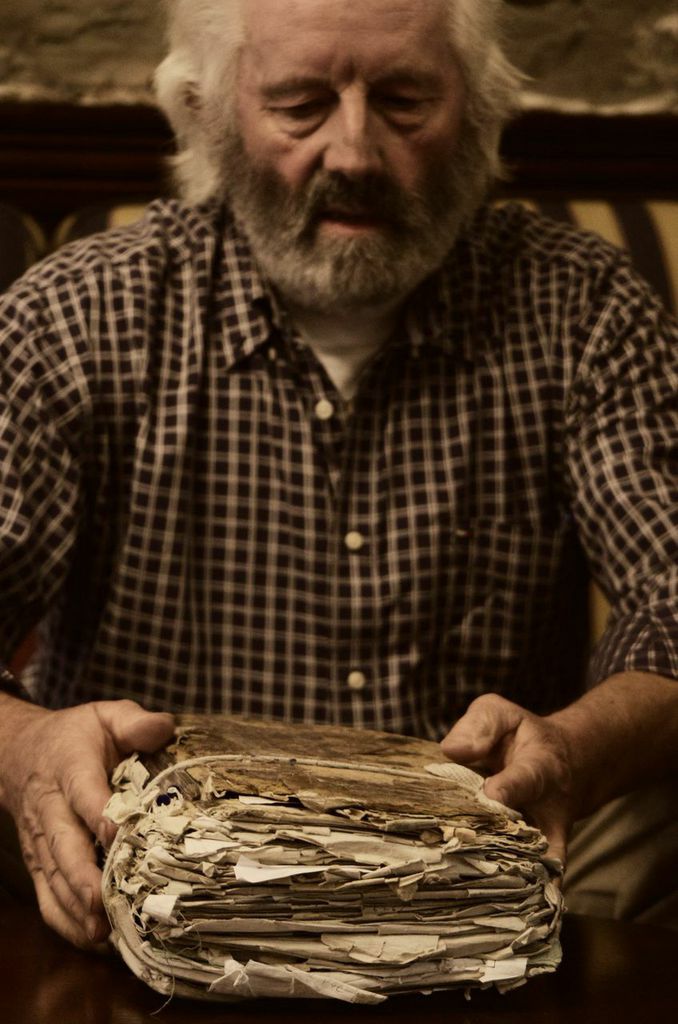
‘This is my lucky book’ he explains. ‘It’s about 160 years old, and belonged to my father and my grandfather. If you touch it, you’ll be married within the year.’
Willie is a third generation matchmaker and along with the magic marriage book, has been passed down the gift of matchmaking. Willie claims to have 3,000 matches under his belt so I ask so I ask him what his secret is? He explains ‘When I grew up the needs of marriage were different: women just needed a roof over their heads, a home to feel safe and secure. But I didn’t like that that much. I felt that when introducing people I’d like them to say when they first meet ‘God, that’s the man I want to spend the rest of my life with’ and that you couldn’t take your eyes off him. So, I always try to create a bit of magic in my introductions.’
Matchmaking has changed a lot over his career though. “When I started 40 years ago my success rate would be about 100% married but it has gradually decreased. Today it is perhaps about 23-24%.’
Why is this? ‘It’s changing times. In the early days a woman or a man would never say no. They wouldn’t change their minds once a match was made. There are more options now and people have a different set of priorities. But it is still down to finding that perfect love. Everybody wants the perfect love and everybody should be in love and everybody needs love to be in a better place mentally and for their life to flourish.’
On that note, I ask Willie why he thought it was so important to incorporate the LGBT community into the matchmaking festival?
‘If I can say anything it is that love is for everybody. They asked me to match-make for it so I’m doing it tonight. I think everybody’s a human being and everybody deserves love. I’m working on that basis now.’
As well as the gay community from the city coming to mix with the rural community in Lisdoonvarna, Willie thinks the festival is a good opportunity for locals who are gay to come out too.
‘I think there are plenty of people in rural places that are gay and haven’t had an opportunity to be out. This is an opportunity. If anything surprised me last year it was that some people, where there was a murmur that they were gay or lesbians, came. They were searching for something and they were able to identify with it. When I saw them here I gave them 100% of credit for coming out and having the courage to walk in here, you know it’s not simple. I thought they were marvelous for it. ’
But what about the local non-LGBTs who seem to be steadily trickling in and out all day? ‘There will be plenty of that.’ he explains. ‘Plenty of onlookers. A lot of people are ringing me about trying to get in, this and that. To try and get passes even though I know they’re not gay. Mostly they are just curious.’
Has there been any negative response though?
‘Well I’ll be very honest about it. There’s definitely a certain amount of older people that don’t like it, but I have spoken to no younger person under 45 that doesn’t think it’s a good idea. I’ve always been different from a lot of people, I think it deserves a chance. It has existed in cities for a long time, there was places in Dublin over 50 years ago for gay people so its going on a very long time. In the next couple of years I would feel that it’s not going to come back from where it is.’
Willie explains he hasn’t actually made an LGBT match yet but he’s hopeful tonight will be the night. However, when I ask if these matches for marriage Willie is non-committal.
‘For me now Rachel, I can’t go saying anything. I’m only starting this at this late stage in my life. I haven’t done it before, been matching man to woman for nearly 50 years. So this is all new. I’m working on the basis that I met quite a lot last year and they were nice people.’
Willie finishes by reading my palm, another one of his skills (I’m getting two kids and a nice husband!) and then rushes off to begin working on making his first LGBT match of the festival. I decide to find out more about the local opinion
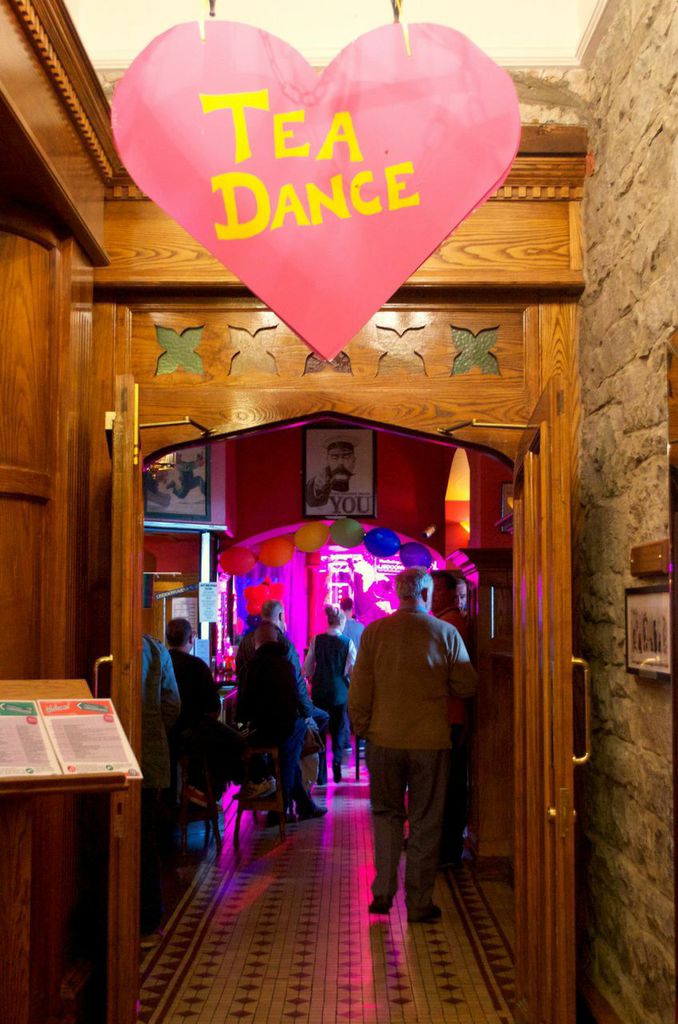
Outside I happen to come across a group of such onlookers as they leave. Three women in their fifties looking slightly disconcerted who I had seen a few minutes earlier with their backs to the wall of the pub, all wearing anoraks and stap-across handbags, looking slightly nervous. They explain they’re ‘passing through Clare’ and decided to pop in. They’re clearly curious but resistant to my questions. When I ask them what they think of the LGBT involvement in the festival the best I can get is an ‘each to their own,’ and as for same-sex marriage, they simply repeat ‘Oh I wouldn’t know anything about that’.
Feeling slightly exasperated, and with the same-sex salsa dancing looking like it will be going on for a while inside, I decide to seek out some dinner. As I make my way through the rainbow bunting clad streets as dusk begins to fall, I notice that the one pub without any rainbow bunting or flags that I noticed earlier, does fairly priced evening meals. It is a typical Irish pub and does some really decent lasagna, but when I approach to pay I can tell the manager who served me is suspicious. I ask him about his thoughts on the festival.
‘Best of luck to them.’ He says gruffly, ‘ It’s not my cup of tea. I won’t be going up there.’ I press him for more comments but realizing this is bad press for the pub, he starts backtracking.
‘Oh yeah’, he defaults to a jokey sarcasm. ‘I’m going up later on. I’ll go up and have a look’ he laughs.
Over in the corner three old-fashioned men in their 60s and 70s with diamond pattern jumpers, grey dress pants and tweed jackets sit in what looks like their usual spot. I approach them, and although a little defensive they introduce themselves as Paddy, Jack and Pat.
‘Are you here for a husband?’ one of the loudly enquires. They’re checking to see if I’m gay.
‘No ‘I admit. Their defense softens a little but my notepad still has them on edge.
All questions are met with a tight-lipped and non-committal response.
What do you think of festival?
‘Great, best year yet. It’ll be quiet when it’s over.’
But what about the LGBT part of the festival?
Paddy-’good’
Jack-’good’
Pat-’good’
The atmosphere is a bit testy. Despite their positive answers, their frowning faces give their opposition away. I realize I’m not going to get anything more out of them, so I go to leave, giving a restrained smile when they offer that I ‘come back early September, get a good man’.
As I head back through town I’m annoyed by the response I’m getting, which is generally feigning ignorance and non-committal replies. This seems to be the general tone of dissenters. I pop into the match-maker bar where Willie was meant to be hosting a match-making session but it is near empty. Making my way to the Hydro on the outskirts of town where it is full of music and activity, it seems not only are the locals avoiding the LGBT community, but the LGBTs are avoiding the locals too. It’s disheartening to say the least.
Back at the hotel I bump into Darren who I’d met earlier and he enquires as to why I seem annoyed. Nodding understandingly and unsurprised he offers an interesting thought ‘But you do realise, the fact that they know not to be vocal or outspoken in their opposition is a sign of progress.’
Some progress. I’m not entirely convinced but he has have softened my mood. I sit down in the comfy chairs of the hotel beside a quiet nervous and shy looking woman and we begin talking. Her name is Kate. She is a 60-ish year old woman from Cork who is here on a little holiday. `I ask if she is here for a match? ‘No. I got my match,’ she says nodding toward her husband who is sitting reading the paper on the opposite couch. ‘Just here for a bit of fun. Everyone here is so friendly and chatty. I like the match-making festival because there is no other place as social for older married people. It is nice to meet people and exchange ideas. I get the impression Kate and her husband hadn’t realised this weekend would be an LGBT event, as her husband, looking slightly grumpy, reading the paper, intently ignoring the shenanigans around him. But Kate doesn’t seem too worried. ‘Everyone seems in good form. There’s more craic than anything.’
I ask her does she think it’s important to accept the LGBT society into society with events like this, and although she was softly spoken and had told me when I started taking down her words she wasn’t very good at interviews, she now begins to talk very passionately, saying
‘I think it’s good to incorporate. I have a beautiful nephew, he’s gorgeous. He had a terrible few years when he was not able to tell that he was gay, he was too afraid of being different. It was quite traumatic for him. And it made me think about things’.
‘Before that, we hadn’t known many. I live in a small community and before that I didn’t fully understand what it was like. It completely opened my mind. I would know people with strong views but people are getting more understanding. They know they have no control over it. Now, if people are saying things against it, I’m more inclined to defend, having seen my nephew.’ She admits her husband had more strong views, but they’re slowly changing. ‘It’s not as terrible as we thought it is. In my youth it was seen as absolutely terrible. There were all kinds of faces on it. Most things of course came from the church. You went to hell if you had any thoughts that they didn’t; want you to have. There wasn’t much love in the Catholic church in those days. Of course, it’s changing now.’
Her husband starts shuffling getting ready to go and as she leaves, her husband inquires suspiciously ‘who was that?’. Open but hesitant, perhaps there is hope in older generations after all, as this gentle old woman had shown me. They’re going out for the night. While they’ll accept their gay nephew, a night of drag performances and gay matchmaking may be too much too soon.
While in the foyer I start talking to Jason Heartford, a 30 something lecturer in Maynooth. I ask him what he makes of the local response, especially by the older generations.
‘I think the response has been overwhelmingly positive.We asked them (the villagers) politely if we could use their village and they said yes. You see this festival has to be integrative on their terms too. It’s good for the gay community to come and be welcomed, to see that the countryside not as demonic as portrayed, that most of the people here are not against them.’
Perhaps Jason has a point. I am beginning to reconsider the real value of this festival. While I had spent all day thinking the festival was about how it breaks down the ‘gay bogey man’ myth here in the rural community there was also a flipside to it’s value. It was helping to break down but the ‘conservative country bogeyman’ for the gay community too.
As I head back to the bar one last time, I see Panti getting ready to take the stage. Approaching her, she agrees to a quick interview. I’m a little speechless, so in awe of her in all her real life, 6 foot tall, tiny waisted generally formidable glory, but nonetheless I managed to jot down some of the interesting things she had to say on the festival.
‘It’s all about the love! Lisdoonvarna is an excuse to have a good time and find love, so that we can recognise it’s all the same.’ she explains ‘This has the potential to be huge. It’s so Irish yet also entertaining to all sorts.’
She explains how the festival serves to unite different Irish communities. ‘There are still pockets that believe you can’t be properly Irish if you’re gay. This is a way of redefining Irishness. To show you don’t have to be GAA-playing, Aran jumper-wearing, Guinness-drinking man. It’s a nice illustration that we are all just the same.’
And with those wise words she takes to the stage much to the delight of her adoring audience. She gives a monologue on the festival full of witty obvservations, and swiftly putting all the audience in their place. (Including the hen party to whom she says ‘stop rubbing your marriages in our faces’) As the music section takes over and two singers serenade the crowd with traditional Irish love songs, it really could be any pub in Ireland, albeit with a lot of balloons and a drag Miley Cyrus waiting to take the stage.
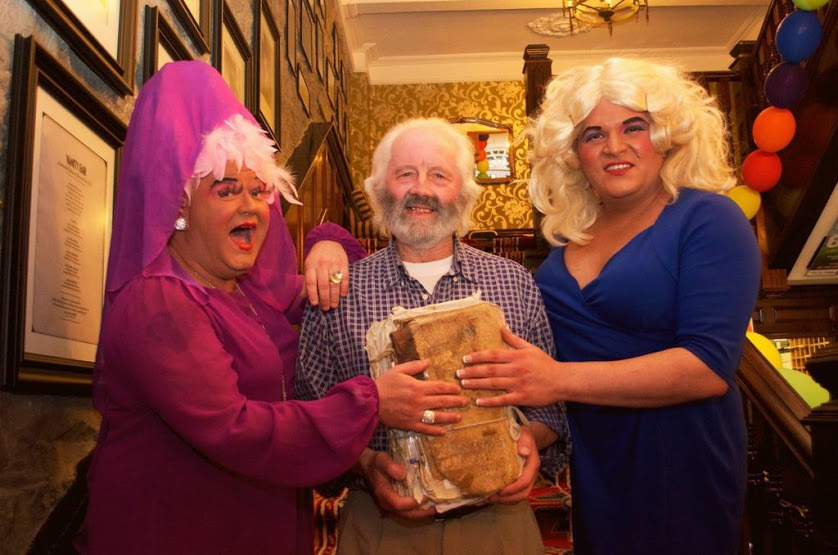
Feeling exhausted after the 5 a.m. start, I realise it is probably my time to leave and stop annoying all the punters with questions and let them enjoy the night. Out in the foyer I say goodbye to Willie one last time. He is in good spirits and informs me proudly that he just found out a couple he matched last year are still together. Willie also seems to have lost the hesitancy he had earlier on and when I ask him how the days been, he launches into an impassioned speech.
‘There’s a few things I was thinking today. People have gone to the moon, you know. And that’s a very big change for people. Another thing, people weren’t around to eat before receiving Holy Communion then they got rid of that. Everything, I think goes. It’s a bit of a thing, there’s no question that people will take a bit of getting used to it all right. There are still a few people that are not with it and don’t approve of it now. But I must say I’ve met no-one under 50 that doesn’t say it’s okay. There’s more saying to me it’s a good idea than saying it’s a bad one. Like you know, it’s there and it’s going to continue.’
As I leave Willie at last, he gets crowded around with requests for pictures, happily posing with several gay couples, all of whom are reaching out and touching the magic book.
Heading back through town there are lots of older couples sitting in cars watching the goings on. They’re not ready yet to go in, but they are watching it all and they are certainly curious. Although keeping a careful distance it doesn’t seem to be hate, just trepidation and nervousness of change that is keeping them away. Meanwhile crowds of local young people are heading in their droves toward the event. The Hydro is full, and getting fuller, almost at bursting point. I watch one worried looking mother inside a 4×4 dropping her daughters off, who are dressed up to the nines and heading for the Hydro. She and all the other watchers, look on at a distance as the next generation heads, full throttle, into the fray.
Photography by Anna Moran.
A version of this story was printed in UTzine Issue 2.
